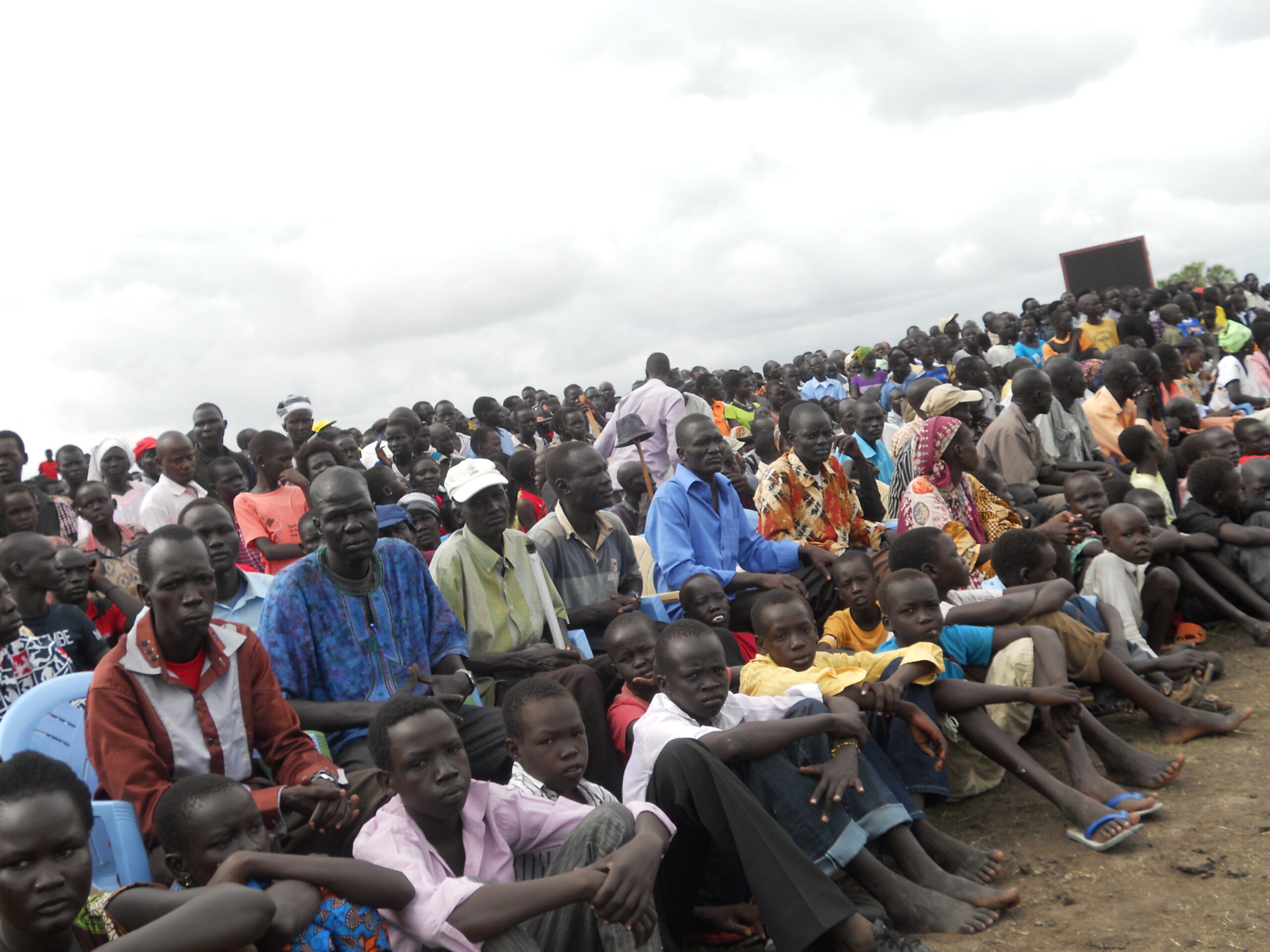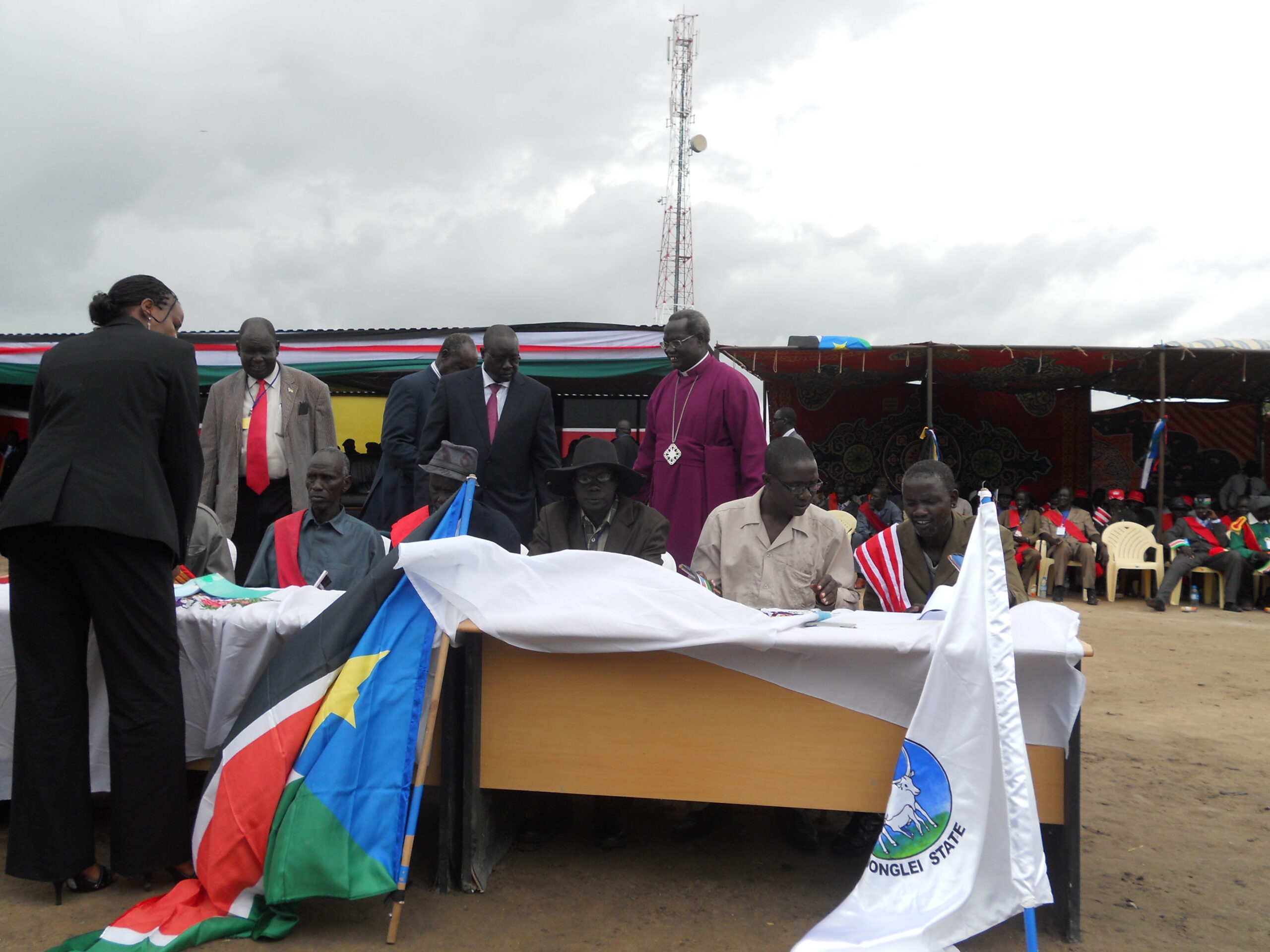President Kiir witnesses signing of Jonglei peace deal
May 5, 2012 (BOR) – South Sudan’s President Salva Kiir witnessed the signing of peace deal by representatives of Jonglei States six ethnic communities on Saturday in Bor as chiefs expressed reservations over lack of punishment for those accused on child abduction and cattle raiders.

However, President Kiir blessed the deal as “historical” and asked traditional leaders respect the accord.
Main recommendations identified unemployment, underdevelopment, lack of roads and child abduction as issues that should be addressed by the government. Return of abducted children and women is also recommended alongside creation of the buffer-zone and road construction in Jonglei State.
Paramount chiefs from Greater Bor, Greater Akobo, Greater Fangak and Greater Pibor as well as head chiefs representing Anyuak, Jie and Kachipo communities put their thumb stamps on the booklet to show their commitment in front of thousands of people at Bor Freedom Square on Saturday.
Some traditional leaders expressed dissatisfaction with the deal, complaining that it does not address how core issues will be handled in future.
“I signed this peace agreement without what I had wanted. Many things are missing,” Manyok Ajak, Twic East Paramount chief told the gathering. Adding: “I signed because I know we are a new state and it is good to test and see what the government will do to make this peace a reality.”
South Sudan became independent in January but face many challenges including insecurity in Jonglei, which has seen massive raids and counter attacks over the last year killing over 1,000 and – in December and January alone displacing over 100,000 people.
The majority of the recent clashes are between the Luo Nuer and the Murle tribe but there have also been instances of raids within and between the larger Nuer and Dinka groups.
Before the peace process a six-week disarmament campaign collected over 10,000 arms, according to the army. However this has also led to some armed groups hiding in remote areas or crossing the border into Ethiopia.
Chief Manyok said penalties for cattle raiders and child abductors should have been included in the text. Compensation for people and cattle looted after the disarmament civilians in greater Bor by Murle should have been included, he said.
The presidential peace committee chairperson, Archbishop Daniel Deng did not responded to the queries in his speech but warned that the accord may collapse if both sides; the government and the chiefs don’t cooperation. Many peace accords between Jonglei’s communities have been signed before but failed to stop the violence, a pattern which many fear will be repeated with this deal.
“NEW CHAPTER”
Paramount chief of Murle, Nganthou Kawelojok, meanwhile said that the peace accord would have been stronger if a new state of Pibor is created for the Murle out of Jonglei, which is South Sudan’s largest state.

But Gatluak Thao, paramount chief of the Lou Nuer dismissed creation of a new state based on demand of particular community but “the government can concern available resources and consider creation of a new state based on population.”
Jonglei State governor Kuol Manyang called the deal a “mega” step toward restoring peace in Jonglei state. Governor Kuol also called for independent monitoring for the implementation of the peace accord by renewing the mandate of presidential peace committee.
“To ensure sustainability of peace building process, I wish to appeal to your comradeship to extend the peace committee to monitor the implementation of the peace accord,” governor Kuol said.
UN Secretary general’s representative, Hilde F. Johnson said the peace accords open a new paper for the perception of Jonglei State around the world.
“This is a feasibility of new chapter in Jonglei state and ending of the chapter of the circle of violence,” Johnson said.
“Jonglei has been famous around the world … because of violence that took place. Today is the opportunity to say ‘no’ to that violence. But no is not enough, resolutions are not enough, we need peace to be followed by dividends of peace to the people, in cattle camps,” she said.
Ms Johnson urged the government to provide security and making sure that road networkds are improved to allow communities to interact and trade as well allow the police and army to respond to reports of raiding.
President Kiir said the “historical peace” should be owned by the people and protected. He said the government will do its part and asks the chiefs to play their parts.
The peace accord does not specify on implementation modalities or how it will be monitored. Draft copies seen by Sudan Tribune does not detail an implementation time frame.
Signed copies, according to the members of the presidential peace committee, had not been released to the media by Saturday evening.
(ST)
